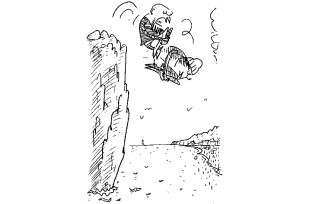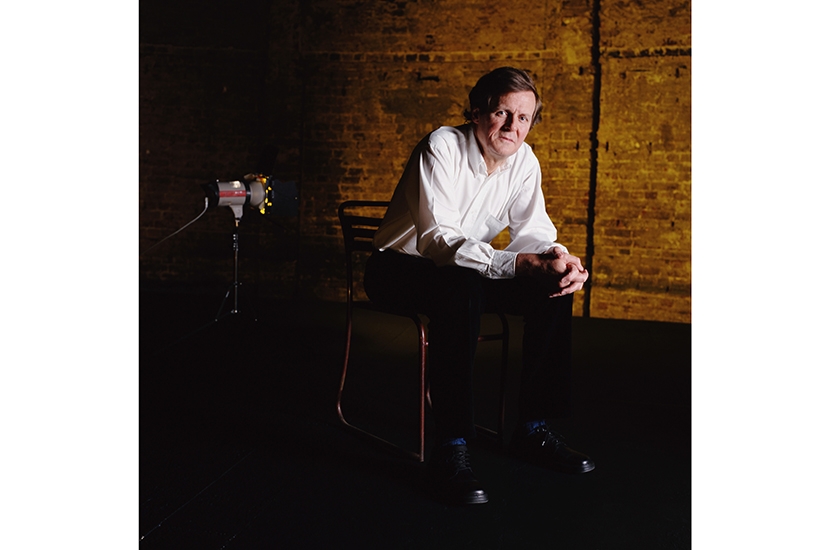A character in David Hare’s Skylight claims she has at last found contentment by no longer opening newspapers or watching television. ‘Well,’ says her astounded interlocutor, ‘you’re missing what’s happening. You’re missing reality.’
Hare himself can never be accused of missing (or missing out on) the reality of what is happening. He has already even mounted his response to ‘what it was like to experience Covid-19’ in Beat the Devil, starring Ralph Fiennes. His instinct has always been to tackle current affairs, sometimes with surreal consequences. When I saw Pravda, which was about Rupert Murdoch and his henchmen, the stalls were filled with Rupert Murdoch and his henchmen — art and life glowering at each other across the footlights.

It is Hare’s own purpose, as he says of the Pop artist Patrick Caulfield, to make sense of ‘the haunting unknowability of the environment in which human beings have to spend their lives’. Unlike Peter Morgan, who reduces prime ministers and other notabilities to figures in a national soap opera, Hare deepens the psychological mystery and allows us to imagine we can see into his characters’ minds — for example in Stuff Happens, which dealt with the diplomatic shenanigans preceding the invasion of Iraq, or The Power of Yes, a study of the reckless behaviour of bankers. Surely his sex-change saga, The Knife, is due for revival, as it was a little ahead of its time when produced in 1987.
In his plays, Hare has explored Britain’s complicity in torture and rendition. He has written about the power of the press, the traditions of the judiciary and the strange mix of jockeying and spirituality that is the Church of England. Always there is a breadth and a caustic wit reminiscent of his idol Chekhov, who likewise saw society as ‘rotten with money, drink and hypocrisy’.
In between the ‘hurly-burly of the rehearsal room and the script-meeting’, Hare has been composing essays and poems, collected in this nutritious book, which demonstrate how he keeps himself bracingly angry by remaining alert (unlike Kyra in Skylight) to ‘unwelcome news’. Did you know that 2,380 disabled people died in the two years following Iain Duncan Smith’s legislation which ‘recategorised them as fit to work’? Or that if a prime minister shows ‘either unusual stupidity or unusual ignorance’, and comes over into the bargain as ‘cynical and calculated’, the chances are he (or she) was educated at Oxford university?
What enrages him most is the notion that a country or society can be reduced to nothing but its economy
Governments, in Hare’s furious estimation, are reliably corrupt and not really much concerned since the days of Clement Attlee (if then) with women’s or workers’ rights, consumer standards, equality, freedom or the rule of law. Today’s Westminster mob in particular, and in addition, hate the broadcast media, their own civil service, transport operators, anyone in defence, doctors, nurses and teachers — everybody except retail tycoons and the financial sector, the greasers and lobbyists, ‘or as they prefer to say, consultants’, which they themselves go on to become. And politicians certainly hate the ordinary electorate, as ‘depraved, spoilt and junk-food dependent’.
If we add to the charge sheet Hare’s shimmering paragraphs about property prices, the collapse of the Greek economy, the invasion of Libya, Middle Eastern civil wars, terrorism in Paris, the bombing of Gaza, the vested interests compromising the myth of free markets and the hollow promises of ‘taking back control’ (from whom? To what purpose?) of Brexit, we can see how We Travelled contains the germs, the viruses, for heaps more classic Hare epics.
What enrages him most is the notion that a country or society can be reduced to nothing but its economy, with no heed (or need) for culture. The foyers of theatres resemble airport duty-free shops, selling stuff. Box-office results and sales figures mean more than constructive criticism — who’d attend to a Kenneth Tynan review today? Television success means high television ratings. Such is the bloated bureaucracy of the National Theatre, there are twice as many employees in the place now as when it opened in 1976 — ‘in order to do fewer productions’. It is hard to find young actors with any ambition beyond wanting to become ‘fifth banana’ in a long-running detective series. Nobody tours theprovinces in a van putting on Shakespeare or Brecht, as Hare did when down from Cambridge.
If he admires individuals who battle against disillusionment and retain their ideals — Rowan Williams, Lee Miller, Louis Malle and Joan Didion are generously discussed — his most passionate chapter is on Jimmy Savile, who embodied everything Hare has singled out as repugnant; from the ‘intellectual funk’ and contempt for reason and decency, to the way Savile dined at Chequers, was fawned on by royalty, and presented himself as a perverted Jesus who replaced virtue with vice. Savile perfected a ‘distinctive mix of gangster boasting and financial greed’. He knew how to deploy ‘bribery and flattery’ with Establishment and authority figures. Violent and sinister, Savile is Hare’s grotesque metaphor of how we are still living now.






Comments